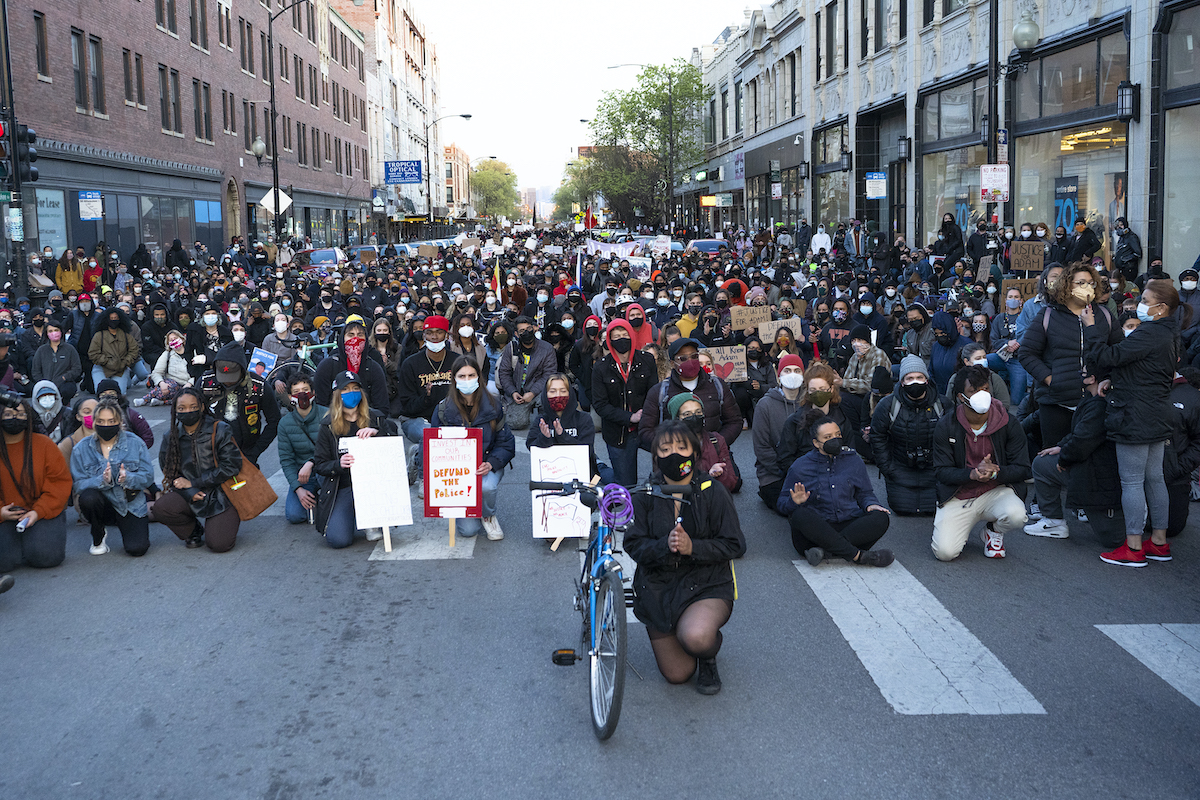

Demonstrators kneel during an April protest near Logan Square in Chicago (Photo by Mateo Zapata/@mateoxzapata)
Editor’s Note: On Thursday, Latino Rebels received the following media release from UnidosUS.
WASHINGTON, D.C. — The number of Latinos and Blacks killed while in police custody is likely much higher than reported by the media and national databases —perhaps by more than double— according to a new report released today by the Raza Database Project and UnidosUS.
According to the research by the Raza Database Project, which is a network of some 50 researchers, scholars, journalists, activists, and family members of victims killed by police, 32,542 people were killed while in police custody since 2000, with Blacks and Latinos making up 20 percent and 17 percent of those killed, respectively. Overall, people of color, who make up 40 percent of the U.S. population, make up more than 60 percent of all people who die in police custody, while Whites, who make up more than 60 percent of the population, accounted for less than 40 percent of all police custody deaths.
“The invaluable work of the Raza Database Project is a disturbing indication that the already overwhelming concern about over-policing of communities of color might be even more widespread than we know,” said UnidosUS President and CEO Janet Murguía. “The numbers we already knew about are unacceptable; these new numbers are unconscionable. This data demands immediate consideration by those in Congress who are working on much-needed law enforcement reform legislation to ensure that their solutions truly reflect the scope of the problem.”
The numbers are also a sobering reminder that there is no fully accurate and transparent national database of those who have been killed by the police or died while in police custody. For example, the Fatal Force database by the Washington Post records 6,303 deadly shootings by police since 2015. However, the Raza Database Project’s data, which include more than shootings, records 13,216 killed over the same time period. The Post’s data doesn’t include ethnicity, either, which is vital to know how to address the issue equitably.
The Raza Database Project research includes not only those shot by police —at 23,664, the majority of deaths, by far— but also those who died from various other incidents, including 6,200 from a vehicle, 576 from an undefined “medical emergency,” 325 from “physical restraint” (as George Floyd was subjected to), 194 from beatings and 40 from pepper spray.
For the report, the Raza Database Project aggregated all names reported in national databases of all deaths by or in police custody from 2000 through May 9, 2021, eliminating duplicate names based on standard social science practices. Then, researchers checked the names against the 2010 Decennial Census of Population and Housing: Surname datasets. By adjusting for known ethnic surnames, they found that the number of Latinos killed while in police custody increased 24 percent from 2,139 to 2,653 from 2014-2021. The number of Asian and Pacific Islanders increased by more than six times, from 217 to 1,427, while the number of those classified as White decreased from 6,536 to 5,871.
And the numbers likely still undercount Latinos and Asians and Pacific Islanders because a significant number have non-ethnic surnames because of relatively high intermarriage rates.
“UnidosUS believes that effective policies to address law enforcement abuse rest on accurate statistics,” said Murguía. “The efforts of groups like the Raza Database Project are evidence that we need a comprehensive, transparent federal database of those who die in police custody that includes not only cause of death but also race and ethnicity data included in otherwise necessary and effective legislation such as the George Floyd Policing Act.”
The report has been introduced ahead of tonight’s joint town hall, “Reunite to Reform: A Discussion on the Future of Policing in America,” which includes panelists Murguía; Rep. Karen Bass (D-CA 37th District); Derrick Johnson, president and CEO of the NAACP; Rep. Jesús G. “Chuy” García (D-IL 4th District); and Art Acevedo, Chief of Police, Miami Police Department. Members of the media are encouraged to attend.


